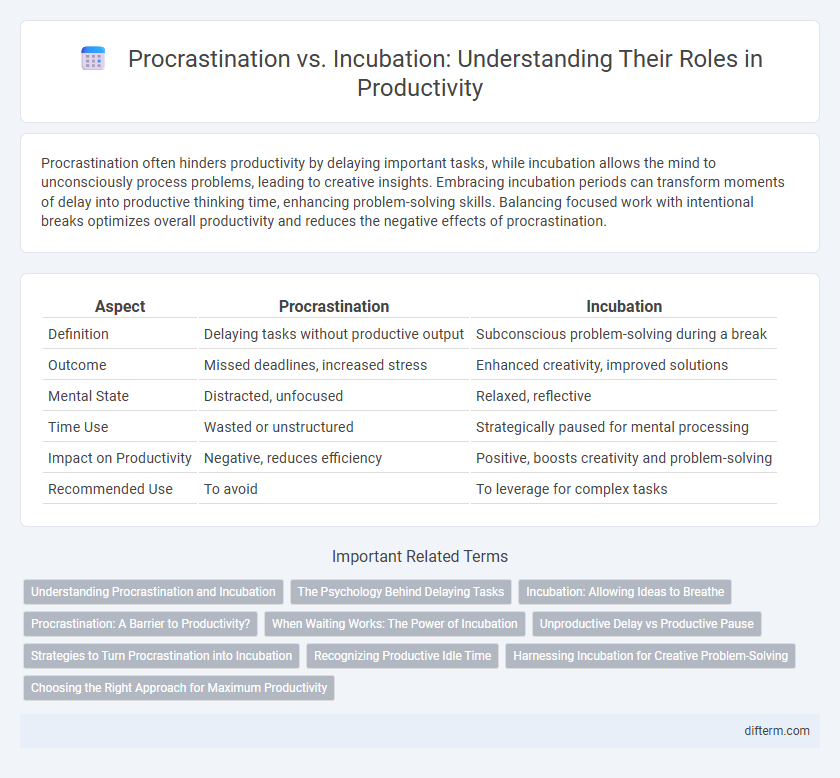Procrastination often hinders productivity by delaying important tasks, while incubation allows the mind to unconsciously process problems, leading to creative insights. Embracing incubation periods can transform moments of delay into productive thinking time, enhancing problem-solving skills. Balancing focused work with intentional breaks optimizes overall productivity and reduces the negative effects of procrastination.
Table of Comparison
| Aspect | Procrastination | Incubation |
|---|---|---|
| Definition | Delaying tasks without productive output | Subconscious problem-solving during a break |
| Outcome | Missed deadlines, increased stress | Enhanced creativity, improved solutions |
| Mental State | Distracted, unfocused | Relaxed, reflective |
| Time Use | Wasted or unstructured | Strategically paused for mental processing |
| Impact on Productivity | Negative, reduces efficiency | Positive, boosts creativity and problem-solving |
| Recommended Use | To avoid | To leverage for complex tasks |
Understanding Procrastination and Incubation
Procrastination often stems from avoidance and fear of failure, leading to delayed task initiation and decreased productivity. Incubation, in contrast, involves subconscious problem-solving during breaks, enhancing creativity and insight. Recognizing the distinction between procrastination as a hindrance and incubation as a beneficial mental process helps optimize workflow and decision-making strategies.
The Psychology Behind Delaying Tasks
Procrastination often stems from anxiety and fear of failure, triggering avoidance behaviors that reduce immediate discomfort but delay task completion. Incubation, a psychological phenomenon, leverages unconscious processing during breaks, enhancing creativity and problem-solving when returning to a task. Understanding these mechanisms helps optimize productivity by balancing focused work with strategic rest periods.
Incubation: Allowing Ideas to Breathe
Incubation plays a crucial role in enhancing productivity by allowing ideas to develop subconsciously, often leading to innovative breakthroughs. Unlike procrastination, which delays tasks without progress, incubation involves purposeful mental rest that fosters creativity and problem-solving. Studies show that stepping away from intense focus periods activates the brain's default mode network, facilitating deeper insight and improved decision-making.
Procrastination: A Barrier to Productivity?
Procrastination often acts as a significant barrier to productivity by delaying essential tasks and increasing stress. Unlike incubation, which allows ideas to mature subconsciously, procrastination typically results in wasted time without substantive mental engagement. Overcoming procrastination can enhance workflow efficiency and lead to higher-quality outputs.
When Waiting Works: The Power of Incubation
Procrastination often hinders productivity by delaying action, whereas incubation leverages intentional waiting to enhance creative problem-solving and insight. During incubation, the subconscious mind processes information, leading to breakthroughs that rushed efforts might miss. Studies show that taking strategic breaks can significantly improve cognitive flexibility and overall task performance.
Unproductive Delay vs Productive Pause
Procrastination often manifests as an unproductive delay characterized by avoidance and distraction, leading to increased stress and diminished output. In contrast, incubation represents a productive pause during which the subconscious mind processes information, fostering creativity and problem-solving. Recognizing the distinction between these states can enhance time management strategies and boost overall productivity.
Strategies to Turn Procrastination into Incubation
Procrastination can be transformed into productive incubation by consciously redirecting attention to subconscious problem-solving during breaks. Techniques such as setting clear goals, scheduling focused work intervals followed by deliberate rest, and engaging in activities that stimulate creativity help harness incubation's benefits. Implementing structured pauses allows the brain to process information passively, turning delays into opportunities for insight and enhanced productivity.
Recognizing Productive Idle Time
Recognizing productive idle time involves distinguishing between procrastination and incubation, where the mind subconsciously processes complex problems leading to creative insights. Research shows that brief periods of intentional rest or mental downtime can enhance cognitive function, improve problem-solving skills, and boost overall productivity. Embracing these incubation phases allows the brain to regenerate focus and generate innovative ideas, rather than viewing all idle moments as unproductive delays.
Harnessing Incubation for Creative Problem-Solving
Harnessing incubation enhances creative problem-solving by leveraging subconscious processing during breaks from active work, leading to innovative insights that prolonged focus alone often misses. Unlike procrastination, which delays progress without productive mental engagement, incubation strategically uses downtime to foster idea generation and improve solution quality. Integrating deliberate incubation periods within work routines optimizes cognitive resources and accelerates problem resolution.
Choosing the Right Approach for Maximum Productivity
Procrastination often hinders productivity by delaying essential tasks, while incubation leverages subconscious processing to enhance creativity and problem-solving. Recognizing when to push through focused effort versus allowing time for incubation can optimize work outcomes and foster innovative solutions. Balancing deliberate work sessions with strategic breaks aligns cognitive resources for maximum efficiency and sustained productivity.
procrastination vs incubation Infographic

 difterm.com
difterm.com